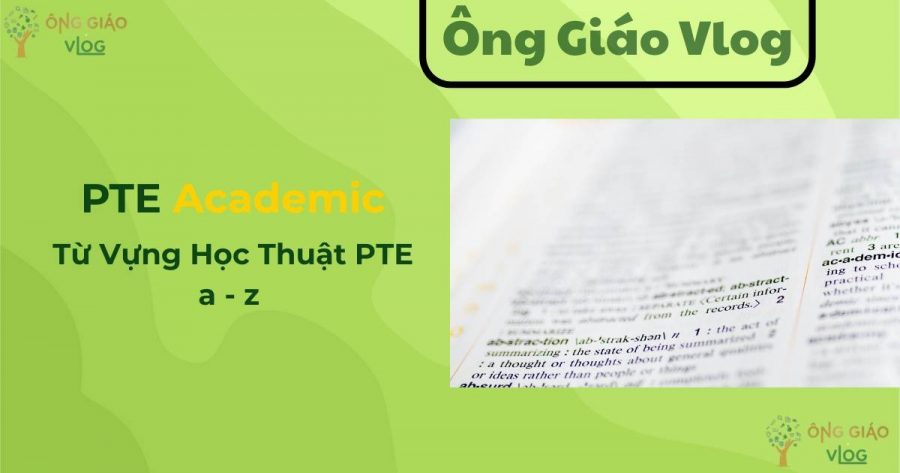Từ vựng học thuật cho PTE: Nâng tầm bài viết và bài nói của bạn
Để đạt điểm cao trong PTE, đặc biệt ở các kỹ năng Writing và Speaking, bạn không thể chỉ dùng từ vựng thông thường. Việc sử dụng từ ngữ học thuật (academic vocabulary) sẽ giúp bài làm của bạn trở nên chuyên nghiệp, thuyết phục và được đánh giá cao hơn.
Dưới đây là một số từ vựng học thuật thông dụng, được sắp xếp theo bảng chữ cái, mà bạn nên nắm vững.
A
Analyze(phân tích): to examine something in detail.- Ví dụ: Researchers analyzed the data to identify key trends.
B
Bias(thiên vị): a preference for or against something, often unfairly.- Ví dụ: The study was criticized for its clear bias towards a particular theory.
C
Constitute(cấu thành, tạo thành): to form or make up something.- Ví dụ: People who are over 60 years old constitute a large portion of the population.
D
Demonstrate(chứng minh, thể hiện): to show or prove something clearly.- Ví dụ: The experiment successfully demonstrated the effects of climate change.
E
Enhance(nâng cao, cải thiện): to improve the quality, value, or extent of something.- Ví dụ: The new policy is designed to enhance public safety.
F
Furthermore(hơn nữa, thêm vào đó): in addition; besides.- Ví dụ: The product is affordable; furthermore, it is highly durable.
G
Generate(tạo ra, sản xuất): to produce or create something.- Ví dụ: The company aims to generate more revenue in the next quarter.
H
Hypothesis(giả thuyết): a proposed explanation made on the basis of limited evidence as a starting point for further investigation.- Ví dụ: The research team formulated a hypothesis about the cause of the disease.
I
Illustrate(minh họa, làm rõ): to serve as an example of something.- Ví dụ: The graph illustrates the decline in unemployment rates over the past decade.
J
Justify(biện minh, chứng minh): to show or prove to be right or reasonable.- Ví dụ: You need to justify your decision with solid evidence.
K
Key(chủ chốt, quan trọng): of crucial importance.- Ví dụ: The discovery of this artifact is a key element in understanding ancient civilizations.
L
Link(liên kết): a connection between two or more things.- Ví dụ: There is a strong link between diet and health.
M
Moreover(hơn nữa, thêm vào đó): as an additional point; besides.- Ví dụ: The new curriculum is engaging; moreover, it is highly effective.
N
Nevertheless(tuy nhiên, tuy vậy): in spite of that.- Ví dụ: The problem is complex; nevertheless, we must find a solution.
O
Objective(khách quan): not influenced by personal feelings or opinions.- Ví dụ: An academic report should be completely objective.
P
Paradigm(mô hình, khuôn mẫu): a typical example or pattern of something.- Ví dụ: The invention of the internet marked a new paradigm in communication.
Q
Quantify(định lượng): to express or measure the quantity of something.- Ví dụ: It is difficult to quantify the benefits of the new program.
R
Relate(liên quan): to make a connection between two or more things.- Ví dụ: The findings of the study directly relate to the issue of poverty.
S
Sustain(duy trì): to cause or allow something to continue for a period of time.- Ví dụ: The company needs to increase its revenue to sustain its growth.
T
Therefore(do đó): for that reason; consequently.- Ví dụ: The cost of living has increased; therefore, salaries should also be raised.
U
Undermine(làm suy yếu): to weaken the effectiveness, power, or ability of something.- Ví dụ: The scandal could undermine the public’s trust in the government.
V
Validate(xác nhận, chứng thực): to check or prove the validity or accuracy of something.- Ví dụ: The results of the experiment validate the initial hypothesis.
W
Widespread(lan rộng, phổ biến): existing or happening over a large area or among many people.- Ví dụ: The use of social media is now widespread across all age groups.
Z
Zone(khu vực, vùng): an area or region distinguished by a particular feature or use.- Ví dụ: The urban planning project aims to create a new industrial zone.
Cách học và áp dụng hiệu quả
Để ghi nhớ và sử dụng tốt các từ này, bạn hãy:
- Học từ vựng theo ngữ cảnh: Đặt mỗi từ vào một câu của riêng bạn.
- Tập viết và nói: Tích hợp những từ này vào các bài luận và bài nói khi luyện tập PTE.
- Đọc các bài báo học thuật: Dành thời gian đọc các bài viết trên các tạp chí khoa học hoặc báo cáo nghiên cứu để thấy cách các từ này được sử dụng trong thực tế.
By Tiếng Anh Thầy Nguyên.

